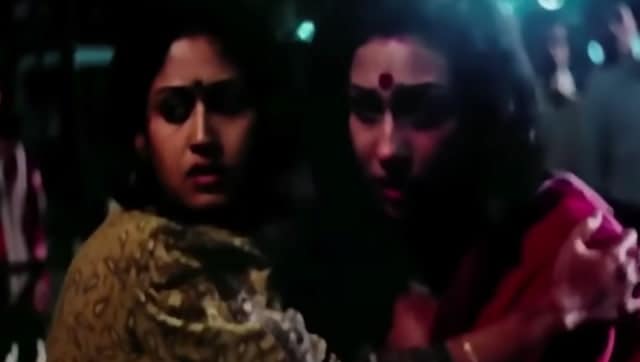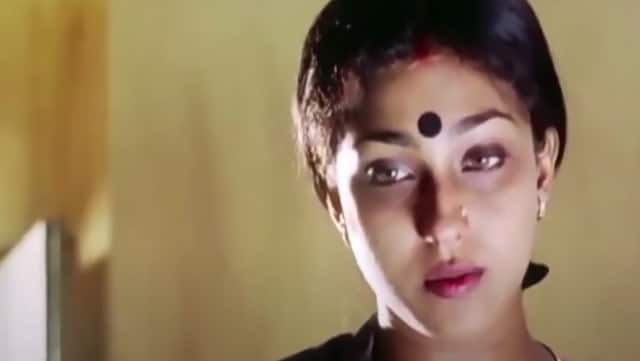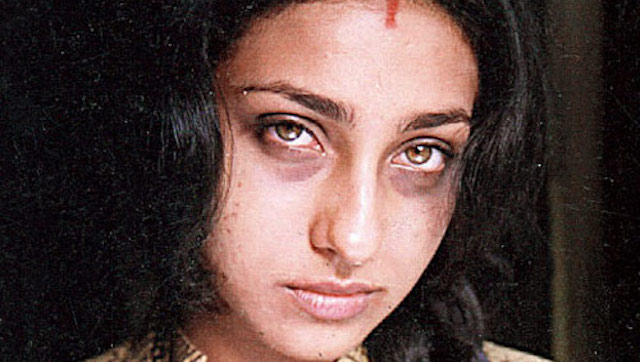(Editor’s Note: This is Part 5 of a series by film critic and consulting editor, Anna M.M. Vetticad)
I remained frozen in my seat for several minutes after I first watched Rituparno Ghosh’s Dahan. I had been a journalist for a few years already by then, and I remember being shaken to the core, thinking: that felt like my story. The specifics of Romita and Jhinuk’s experiences in Dahan are unrelated to anything I have been through, but in those years when I had only just discovered that sexual predators are not confined to streets and Delhi Transport Corporation buses but also roam professional spaces where we expect to feel safe, I could relate to the extreme loneliness in their battles as if they were my own.
A friend wrote to me suggesting that I feature Ritwik Ghatak’s Meghe Dhaka Tara in this series. Another proposed K.A. Abbas’ Saat Hindustani. So I want to start this week’s essay by reminding readers that this is not a series on India’s greatest films or my all-time favourites: this is a selection of great Indian films that from my childhood up to my early years as a journalist affected me personally in specific ways that awakened the film buff in me, and ultimately set me off on a path to becoming a film critic. The ocean in Ramu Kariat’s Chemmeen – that I watched when I was perhaps eight years old – introduced me to the impact that visuals can have on a viewer. Satyajit Ray’s Mahanagar gave me my maiden sliver of a realisation of the feminist potential of cinema. I was deeply distressed even as a child by the destructive power of social ostracism portrayed in Chemmeen and moved by the possibility of an individual getting sensitised to the concerns of a social group other than his own as showcased in Hrishikesh Mukherjee’s Namak Haraam . Jahnu Barua’s Hkhagoroloi Bohu Door opened a window to cinema as a means of travel for me. And after I saw Dahan (1997), I knew that irrespective of where my career took me, I would always write about films.
Dahan is based on Suchitra Bhattacharya’s novel of the same name that in turn was based on a real-life incident reported in Kolkata in the early 1990s. The conflicts in the film kick off when a middle-class stay-at-home wife, Romita Chaudhury (Rituparna Sengupta), is molested by a group of men one night near a Metro station, and her husband Palash is beaten unconscious when he tries to defend her. Passers-by avoid intervening to save themselves the trouble, until a young schoolteacher called Srobona Sarkar (Indrani Halder) stops. She is hurt but succeeds in preventing the ruffians from abducting Romita.
What follows initially is to be expected. Srobona, known as Jhinuk to her family, is lauded for her courage by the press, family, colleagues and the community. Meanwhile, Romita nurses her injuries and her mental trauma at home.
Then comes the unexpected – or rather, Jhinuk and Romita could not have predicted the subsequent turn of events although it is unsurprising to any close observer of middle-class Bengali society or India at large. (Spoiler alert) Romita’s in-laws’ and husband’s initial concern melts away quickly and she becomes an object of suspicion within those four walls as family “honour” takes precedence over her well-being when gossip spreads that she may have been raped, not molested. There is speculation too that she was having an affair with one or more of her attackers at some point. Instead of denouncing wagging tongues, Palash questions Romita’s character. When she objects to his comments, he beats her up and rapes her.
Jhinuk has her own share of problems. Fulfilling her legal obligations as a witness in Romita’s case becomes a headache, and soon she faces pressure from her boyfriend Tunir to retract her testimony. His career is at stake if she persists with the truth, since one of the ruffians belongs to an influential family with connections at his workplace. (Spoiler alert ends)
[caption id=“attachment_8909391” align=“alignnone” width=“640”]  Indrani Halder (L) and Rituparna Sengupta on the night of the attack in Dahan.[/caption]
Ghosh’s matter-of-fact direction, his screenplay, his empathy and the flawless, naturalistic acting by Sengupta, Halder and their co-stars lend themselves beautifully to the manner in which the women leads are shamed for the actions of men. Dahan is credible and effective because it is shorn of melodrama. It is chilling because its echoes can be heard on a daily basis in our lives, and because the women are humiliated most emphatically in spaces that are meant to guarantee them security but do precisely the opposite: Romita in her bedroom and Jhinuk in the courtroom where she is badgered on the witness stand.
In an excellent essay headlined “The Impossible Collective: A Review Of Rituparno Ghosh’s Dahan (1997)” published on June 1, 2014, on the website of the NGO TARSHI (Talking About Reproductive and Sexual Health Issues), Kolkata-based academic Trina Nileena Banerjee analyses the import of various such spaces in Dahan’s vocabulary: the balcony “poised precariously between the inside and the outside, the public and the private, freedom and confinement – that becomes one of the points of contention in the domestic strife between Romita and… Palash”, the road that Romita gazes down upon from that balcony, the road down which Jhinuk walks by herself in the final shot, the home for the elderly where Jhinuk’s grandmother chooses to stay rather than with her family.
“Romita stands sleepless all night in the balcony, ignoring Palash’s accusation that this is simply another attempt to draw sexual attention to herself,” Banerjee writes. “Romita’s access to any outside space has been taken away silently but firmly after the incident of molestation; she is disallowed from leaving the house for any reason but to see the doctor. This little space of the balcony, between the bedroom where she silently endures marital rape and the outside where she is seemingly in constant danger of assault, seems the only space where she might legitimately belong.”
Rituparno Ghosh often spoke of Satyajit Ray’s influence on him. One commonality between his works and Ray’s filmography is the constant acknowledgement of women as allies of women. Public conversations about patriarchy tend to focus on women who act as enablers in the denial of rights to other women and de-emphasise women who stand by women – both sets exist, yet one is highlighted; Ray, and later, Ghosh, defied the tide. Like Arati in Mahanagar who stands up to her boss for making judgemental remarks about his Anglo-Indian Christian woman employee, here in Dahan the heroines’ female allies are underlined and stressed far more than the women who undermine them.
[caption id=“attachment_8909401” align=“alignnone” width=“640”]  Rituparna Sengupta as Romita Chaudhury in a still from Dahan.[/caption]
The most obvious of these woman-woman equations in Dahan is Jhinuk’s support for Romita. The way the latter’s family ensures that they never meet or speak after the assault (in the courtroom they do not interact at all) is a perfect illustration of patriarchy’s dread of female solidarity.
There are other women that the protagonists get to lean on. Romita has her sister-in-law (Mamata Shankar) who continues to tend to her after everyone turns against her. She also finds solace in the letters she writes to her sister. And Jhinuk’s bond with Tunir is overshadowed in the narrative by her rapport with her grandmother.
On the sidelines is the unspoken solidarity with Romita and Jhinuk of another woman in the story. It comes in the form of her revulsion for one of the molesters, a man she is engaged to marry.
Much has been made of the fact that a majority of Ghosh’s films were centred around women. The running thread of female camaraderie in them merits a separate discussion. In Unishe April (1994) – winner of the National Award for Best Feature Film – with which he shot into the limelight, a daughter (played by Debashree Roy) has spent a lifetime resenting her mother (Aparna Sen) for prioritising her career as a dancer over her marriage and motherhood, but in the end, she arrives at a difficult understanding of that same mother, of a woman’s right to her passions and of compatibility within marriage. A few years later in Titli (2002), Sen and her real-life daughter, Konkona Sensharma, played a mother-child duo who are exceedingly comfortable with each other until the teenager begins to view her beautiful mother as a rival in love; in the end though, the girl evolves and is able to see her mother as an individual beyond her role as a parent.
Barring that brief interlude, Urmila and Tilottama a.k.a. Titli in Titli are happy together. Not so the women of Unishe April and Dahan. Ghosh himself drew a link between the latter two films in an interview in the 1990s, recorded when Dahan was selected for the Indian Panorama section of the International Film Festival of India. “Every creative artist…has some amount of loneliness and I think that is a basic trait which is present in both my films, Unishe April and Dahan,” he said. “I have dealt with the subject of loneliness where they, the mother and the daughter (in Unishe April) are lonely and they finally, either they accept their loneliness, they’re coming to terms with their loneliness or they get together… Here also my film (Dahan)…I like the story because I thought it was a communication between two women who meet in the film just once, and never do they meet again, but there is a constant interaction between these two lonely women and how finally they become two very lonely individuals in the system.”
My takeaway from Unishe April was not loneliness but a long-overdue articulation of affection. The older woman in the story, Sarojini, has not been lonely in the conventional sense: she is surrounded by students, fans and a boyfriend, if one may call him that, who she has chosen not to marry since she sees no reason for it. Her loneliness arises from her daughter Aditi’s undisguised hostility towards her. Aditi, for her part, has been desolate while wallowing in her bitterness towards Sarojini and romanticising her dead father. The climax, however, is one of acceptance between the two. And maybe companionship?
[caption id=“attachment_8909411” align=“alignnone” width=“640”]  Indrani Halder as Srobona Sarkar a.k.a. Jhinuk in a still from Dahan.[/caption]
Dahan concludes though on a note of both loneliness and hope – neither Romita nor Jhinuk is shown taking an overtly rebellious stand about their respective relationships, but the finale remains open-ended and hence, optimistic on that front for viewers who are averse to fatalism.
The Bengali word “dahan” translates to “combustion” or “burning”. The title is an apt signifier of the blazing loneliness in the two women’s continuing struggles – despite the backing they get from certain quarters – and the flickering flame of hope that they may yet triumph, both of which the film leaves us with.
Ghosh deservedly won a National Award for Best Screenplay for Dahan, while Sengupta and Halder shared the National Award for Best Actress that year. Ghosh was not always as brilliant as he was in Dahan. In fact, in later years, he became terribly inconsistent, swinging wildly from the abysmal pretentiousness of the English film The Last Lear (2008) starring Amitabh Bachchan, Preity Zinta, Arjun Rampal, Shefali Shah and Jisshu Sengupta, to the warmth and old-world atmospherics of the Bengali film Noukadubi (2011) starring Raima Sen, Sengupta, Riya Sen, Dhritiman Chatterjee and Prosenjit. His admirers would disagree, of course. Either way, with his best works – Dahan being on top of that list – he earned his place among Indian cinema’s greats.
ALSO READ:
- Indian films that sparked the critic in me: Satyajit Ray’s Mahanagar is the definitive feminist classic
- Indian films that sparked the critic in me: Ramu Kariat’s Chemmeen remains misunderstood and misrepresented – even by its admirers
- Indian films that sparked the critic in me: Jahnu Barua’s Hkhagoroloi Bohu Door is an indictment of cold-hearted development
- Indian films that sparked the critic in me: Was Hrishikesh Mukherjee’s Namak Haraam a closeted gay romance?
- Indian films that sparked the critic in me: Fazil’s Manjil Virinja Pookkal owes everything to Jerry Amaldev’s music and Mohanlal
- Indian films that sparked the critic in me: Jwngdao Bodosa’s Hagramayao Jinahari is a rare window into Bodo lif e
- Indian films that sparked the critic in me: Abrar Alvi’s Sahib Bibi Aur Ghulam embodies sensuousness and self-destructive decadence
- Indian films that sparked the critic in me: Aparna Sen’s 36 Chowringhee Lane is the ultimate portrait of rejection in old age
- Indian films that sparked the critic in me: Singeetam Srinivasa Rao's Pushpaka Vimana speaks volumes with its silence
- Indian films that sparked the critic in me: Raj Kapoor's Awara swings between feminism and romanticising intimate-partner violence
- Indian films that sparked the critic in me: P. Bhaskaran & Ramu Kariat’s Neelakuyil married caste, sexual politics and George Eliot


)
)
)
)
)
)
)
)
)



